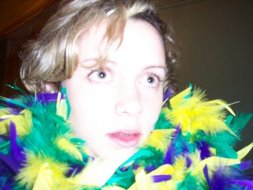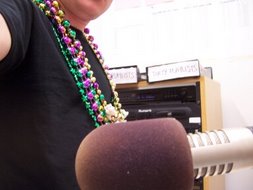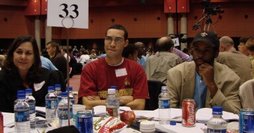 On Saturday morning, we woke up early and headed to Freret Street to prepare for the festival. Preparations at the neighborhood center went well, though the work began with me and a very strong man digging heavy sludge out of a storm drain, not exactly the fairest of sights. Up and down the street, tents went up and vendors prepared for the thousands of festival-goers. By 11am, I was done and took a walk to eat and catch some music. At 1pm, I returned for the scheduled sound-check in the backyard of the center, where there’s a small stage for a planned rap showcase put on by some neighborhood kids. Well, long story short, we had to hustle together additional microphones and no one had a cd player or mixer, or a DJ for that matter. So to the Bywater and back I go, returning with my equipment to serve as best I could. Like the song goes: Toney’s his name, he lives on his own.
On Saturday morning, we woke up early and headed to Freret Street to prepare for the festival. Preparations at the neighborhood center went well, though the work began with me and a very strong man digging heavy sludge out of a storm drain, not exactly the fairest of sights. Up and down the street, tents went up and vendors prepared for the thousands of festival-goers. By 11am, I was done and took a walk to eat and catch some music. At 1pm, I returned for the scheduled sound-check in the backyard of the center, where there’s a small stage for a planned rap showcase put on by some neighborhood kids. Well, long story short, we had to hustle together additional microphones and no one had a cd player or mixer, or a DJ for that matter. So to the Bywater and back I go, returning with my equipment to serve as best I could. Like the song goes: Toney’s his name, he lives on his own.Man, hip-hop is such a weird world down here. Musically, the differences with New York are obvious, but the differences in the scene (as I know it, which is minimal) are another thing. I noticed this when I did that radio show this summer, but—straight up: a lot of people here look at a white dude who’s interested in hip-hop like he’s from another planet, especially if he doesn't dress/talk all over-compensated. Not hostility, but almost right through you, like there’s no way you could be there or understand anything. In New York, underground hip-hop in particular has people of many races who’ve been around for a minute. Sure, there are issues, but there’s nothing new about it. Hip-hop is everywhere up there—stylized, entrenched, often overly-dramatic and macho, but a part of the entire place.
Here, hip-hop is more street-centered, more based in the projects that are now gone, the devastating violence and poverty, the appreciation of dance and specific neighborhoods, and the teens so feared by the newspaper and its suburban readers. And it’s not just the image of hip-hop here that is isolated in a way, but the style of the music itself. New Orleans hip-hop owes so much to Bounce, which wasn’t a national phenomenon or even concerned with anywhere but New Orleans (this is a great thing in many ways, as is Bounce). Bounce, I always think, is a little like early dancehall in that it is purposely local. Dancehall was a reaction to the popularity of reggae, both roots and lovers rock, which became a world music. Dancehall was intentionally unintelligible to the non-Jamaican (well, there’s a cat from Dorchester, but…). New Orleans hip-hop is similarly focused on the immediate audience. A Lil' Wayne might happen eventually, but so might Buju Banton.
Secondly, the conditions of its arrival are vastly different than that of New York. The city’s perpetual paradox of brutal violence and popular creative catharsis meant either viciously menacing raps (“Make ‘Em Say Ugh”) or infectious dance music (“Back Dat Azz Up”). I remember a NY Times article after the storm that focused on the abscence of NO's hip-hop in the tributes to the fallen city. To which I replied: no one gave a sht about it before the storm, and it pretty much didn't give a sht about anyone else, and you weren't going to find a "Do You Know What It Means..." in the catalog.
There’s very little “conscious” shit out there from N.O. artists (perhaps a result of the political realities), and the style of emceeing is much more tied up in flowing with a trigger beat, or repping a neighborhood, finding the best phrase to repeat. That’s not to say anything negative at all, as such styles demand things that many a rapper couldn’t handle. My point is that New Orleans rap is highly unique, developed very much on its own terms. And though I know a little, I don’t know a lot.
But there I stood, spinning back up tracks to a yard full of spectators, many young, some older, most of them offering little visual response to my choices or the performances of the artists. Years at EVR taught me to just keep on with it, to roll with intrusions, attitudes, surprises, and beefs. There were young cats who didn’t know how to act, and young girls who have local radio hits. Once we finally got started, it was fairly smooth, but, man, was it a trip.
I stood under a blue tent with blue netting and played the backup tracks and some commercial NY hip-hop I had with me. The artists were fairly amped to be there, and much professionalism was attempted. At one point, one of the girls very solemnly asked if I had a card, and I handed her my business card, for “Executive Manager.” Another asked if I could play some Bounce, and I said I would if someone gave me some, since I was being fed a mixtape of new R&B and some Weezy at the time. The order of performances was never clear and constantly revised. The level of posturing was high all around, as some dudes had matching outfits and a stage mother instructed me on the order of her daughter’s tracks.
But everyone wanted to be on that stage. They wanted to do hip-hop in front of people and to rock a crowd, and they wanted to stand out. I can relate to that, though this time I pulled my hat low and drove through the sets, content to be a bit player/observer.
I guess there were some complaints about the cursing, both my selections and the live ones, but that’s hard to stop. What’s funny is there wasn’t a hint of menace in the air. People—hustlers, family members, little kids, a couple white hipsters, whoever they all were--didn’t express much of anything, but they took it all in. In this city, a live performance is nothing special, unless of course you’re repping for your friend or cousin who’s onstage. Everybody knows a musician, so you watch and think who else you’ve seen, if you could do that, if maybe there’s something else to be heard down the block.
In the end, I had a seat on a very normal, if hectic, day in New Orleans hip-hop. I’m not so into songs where the hook is just “Money-ma-money-money/money-ma-money-money” (really, that was one), but rappers did their thing. If there were awkward or ridiculous parts or an abundance of fronting, there were moments when someone really felt they were making it, like they were that video star they’d been emulating for the last two months, the hardest or sexiest one in the whole joint.
I’ve dj’ed in some funny situations, and I can always relax once I’m in the set and hooked up, going with it and choosing music. Which is good, because this one was a whole other thing. Like a few other times I can think of, though, it was a bizarre, fresh time to be DJ Toney Blare.
$*$*$*$

When we pulled up on Broadway tonight, I was feeling giddy. In my wizened alumnus-hood, I often feel this way when I’m on Tulane’s campus. The resentment of the place’s absurdity is gone now that I don’t pay them, and I can embrace the whole joke that is that university, crack up at it, even. And there’s nothing more ridiculous than Tulane’s rare attempts to act like an institution of higher learning.
Like, for instance, hosting a public lecture. Last week, as I strolled to the WTUL studio, I stopped in my tracks to appreciate a sign of the times. Strewn across McAlister Drive from one graceful oak to another was a banner that read, “Salman Rushdie.” Respek, Tulane, I thought.
For how very odd it is that Rushdie is a minor star on the college lecture circuit, and that said circuit would bring him to New Orleans. With Islamic fundamentalism a full-blown scourge of the planet, this freed former enemy takes the stage in an American city stricken by the consequences of a war against that scourge. A decade ago, Rushdie was in hiding; today, he’s at Tulane.
And apparently everybody had heard about it. Kim and I arrived at Dixon Hall to find a crowd of students and some adult types who eagerly told us that the lecture was sold out. We walked right in to find a lone Tulane cop trading hysterics with an Asian couple.
"Ma'am! Ma'am! Get back, ma'am!" he cried.
“I’m sorry, sir, but we’ve been waiting long enough!” the lady said. The cop told her “No!” then turned to me and told me I couldn’t come in. “Can I use the bathroom?” Nope, scheme denied. The Asian couple remained obstinate.
“Put a fatwah on her!” I yelled as we left. Then we followed some sneakier students through a back entrance, found a side door to the auditorium, and took a place to stand along one wall near the stage.
Except for basketball games and a crawfish boil or two, I’ve never seen that many people at any event on the campus. The balcony was full, as was most of the standing room. Scott Cowan growled some praise, and then two English professors affirmed the greatness of Rushdie, and then Sir Salman Rushdie entered stage right.
The title of tonight’s lecture: "Public Events, Private lives: Literature and Politics in the Modern World." And let me tell you, Salman Rushdie is quite comfortable at Public Events. He began with charming remarks that included jokes about outliving Khomeini and the cheapness of Paris Hilton. The young folks were putty in his hands, and Rushdie took his time, with many a humorous flourish en route to a general musing on the role of the fictionist as truth teller. Many hands moved in note-taking, and the crowd switched on a dime from laughing with Rushdie at Saul Bellow’s line “We don’t have responsibilities—we have inspirations,” to agreeing with him that, actually, Bellow was right. People were eager to be pleased and to agree.
Rushdie did hit lightly on some interesting things, one of which was the idea of memory as a political act. Having noted that the novel originally served a journalistic role (see Dickens), he discussed his own work’s clash with Indira Gandhi’s official record, all to show that the resilience of memory is vital to countering propaganda and dictatorship. Fair enough. Thing is, I don’t think its official truth that’s killing us: I think the exponential increase in the versions of truth, and in the public exchanges of those versions, are what weakens our memories and our ability to tell the facts from the dictator-speak.
Now to Khomeini, the change of subject that, Rushdie laughed, was like the Stones playing the opening bars of “Satisfaction”: OK, here’s what we came for, the hard stuff. But then he chose a funny story to discuss the experience. Apparently, a movie called “International Guerillas” came out during this time, with an evil caricature of Rushdie battling a team of Muslim assassins. The movie was horrendous, but Rushdie stood up for its right to public screening in an immigrant neighborhood in Yorkshire, England. By killing the censorship, he and his allies killed the movie, which no one went to see.
His point was that resistance was best done through an insistence on freedom. I thought we might flip this over and say something about The Satanic Verses (which is a fine novel): by trying to kill it, Khomeini birthed an international sensation, submerging for most intent that actual contents and quality of the book. And while I’m sure such an argument is not new to Rushdie, it was weird that he didn’t acknowledge it. He seemed to think we'd triumphed over Khomeini, even as Sadr plays with the fate of Iraq.
 Instead there was an acknowledgement of the great risks and valor of booksellers and writers who supported him through that dangerous time, occasionally in the face of pipe bombs and book burnings and even a shooting in Norway. Huh, I thought, but no mention of all the explosions and fires that have followed Islamic fundamentalism in the 10-20 years since. No mention of, say, the life of present day Pakistani writers under Musharaff, or the Bengali poet laureate who died a few years ago after a fierce beating by extremists. Certainly no shout out of solidarity to those who wrote in the wake of natural disaster.
Instead there was an acknowledgement of the great risks and valor of booksellers and writers who supported him through that dangerous time, occasionally in the face of pipe bombs and book burnings and even a shooting in Norway. Huh, I thought, but no mention of all the explosions and fires that have followed Islamic fundamentalism in the 10-20 years since. No mention of, say, the life of present day Pakistani writers under Musharaff, or the Bengali poet laureate who died a few years ago after a fierce beating by extremists. Certainly no shout out of solidarity to those who wrote in the wake of natural disaster.Not that he must cover these things, but it was all too cozy, these omissions. Like Tulane itself, the detachment of Rushdie’s talk from the realities of our world left us a little hollow. When he closed things by advising writers to reside on the frontier, to push the frontiers, well, I immediately thought of his posh life in London and the strange lack of mention of his more recent works.
And as usual when someone visits and pontificates, I wondered if he noticed the frontier he stood on, the blown apart America that is no longer just Bellow’s alienation, but a battleground. He tied New Orleans with New York, which misses a ton of points, and yet doubled the disservice by not tying his own sufferings more directly to those events, and to the rest of us. He mentioned the effects of public events on private life, how your character can’t determine your destiny in such a world, and how the novel resists such a development. Good points, but he pretty much stuck with how his novel survived, and all the goofy bumps in that road, and avoided any talk of other public events or possible destinies. To be blunt, he and Tulane didn’t have much to say to New Orleans, and I can’t laugh at that so much.
?*?*?*?
Public events in this town are legion, and the holding pens and amphitheaters and barstools and backyards do well as ecosystems. Truth, your story or hers, can pour out in letters to the editor, or stutter over microphone feedback. People do their best to share, to appreciate the exchange. There’s a hitch, though, in the presentation, and I believe it reveals a lot more than the story that is struggling to come out. That hitch is a comparative reflex, like when I wonder what Rushdie noticed on his way to the airport, or that security guard found himself nearly overwhelmed by literature fans. It doesn’t make sense; it doesn’t follow a norm or a system. People front or get too eager. You can’t be sure what’s an authentic performance, and what’s an exercise in holding one’s breath. In the end, the bottom could drop out and everybody ends up naked or no one shows up in the first place and the electricity is out.
 It is so very, very weird to gather and watch these days. I don’t think I thought that 10 years ago. Not sure what that means, but maybe this is the accumulated lack, the way the empty neighborhoods call to us when rooms are crowded. The way violence is both a kid’s show and a block away.
It is so very, very weird to gather and watch these days. I don’t think I thought that 10 years ago. Not sure what that means, but maybe this is the accumulated lack, the way the empty neighborhoods call to us when rooms are crowded. The way violence is both a kid’s show and a block away.Representing: old as it is, it needs some working out in New Orleans.



















